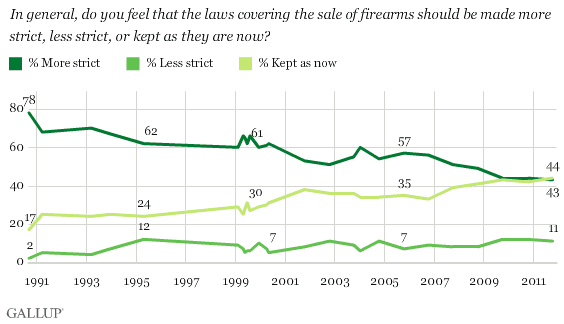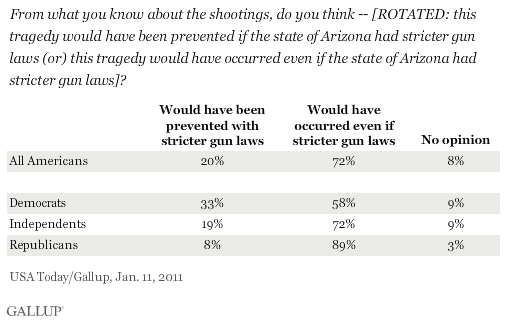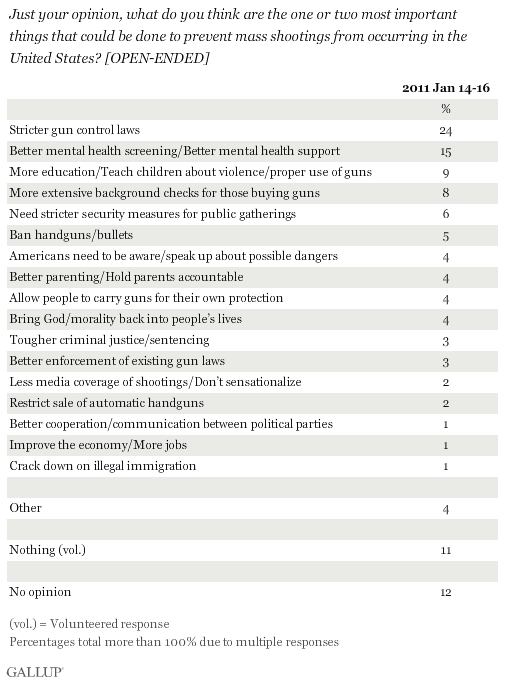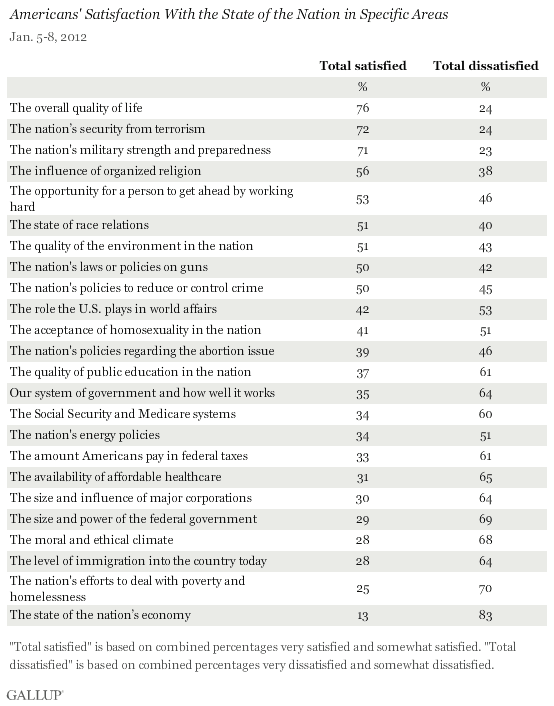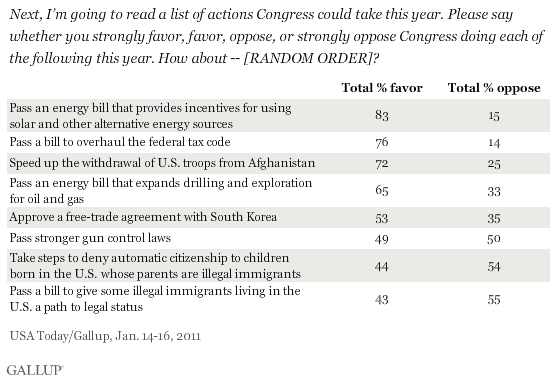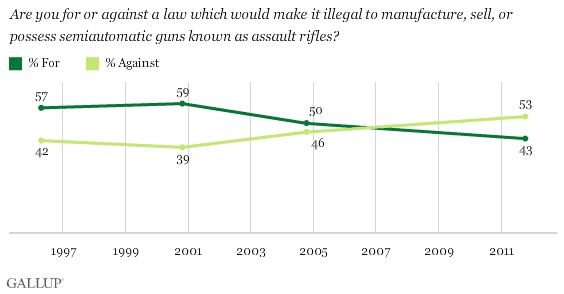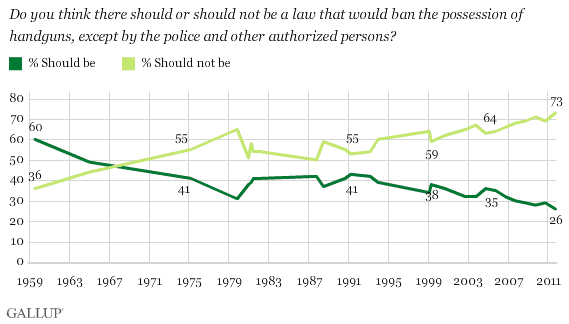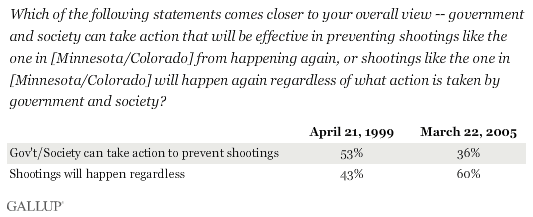The tragic deaths of 20 children and 6 adults on Friday in Newtown, Conn., at the hands of a gun-wielding mass murderer raises again the issue of laws and policies concerning the sale and possession of guns.
Since laws and policies reflect the will of the people as manifested through their elected representatives, an understanding of American public opinion on this issue is critically important.
We at Gallup have written about gun control attitudes following mass shootings all too frequently over the last decade. The bottom line is that these tragic incidents do not appear to have affected the generally downward trend in support for stricter laws.
During the time period between April 1999 and October 2012, the nation saw mass shootings that resulted in the deaths of 32 people at Virginia Tech in April 2007; 13 at an immigration center in Binghamton, N.Y., in April 2009; 13 at Fort Hood, Texas, in November 2009; and 12 at a movie theater in Aurora, Colo., in July 2012. Numerous other incidents claimed lives during this time period, including the shooting at a outdoor rally in Tucson, Ariz., in January 2011 that took the lives of six people and critically wounded U.S. Rep. Gabby Giffords.
Despite all of these incidents over the past 13 years, Americans have, in general, become less likely to say that the country needs stricter gun control laws. In February 1999, the last poll before the Columbine shooting, 60% of Americans said the nation needed stricter gun control laws (this was in response to three options given to respondents in Gallup's basic trend question: more strict, less strict, or kept as is). Within days of Columbine, an April 26-27 survey showed a slight increase to 66% in 1999. From that point on, the "more strict" percentage began to decline. It fell below 50% for the first time in October 2008. Last year it was 43% in October, the all-time low.
Gallup will update its basic trend question on gun control this week. A short-term uptick in the percentage of Americans wanting stricter gun laws would not be unexpected. This happened after Columbine. The real issue will be the degree to which the general pattern is disrupted on a longer-term basis. This historical pattern would suggest that long-term attitudes about gun control will not be substantially changed as the result of the Sandy Hook Elementary School shootings. It is possible, however, that this latest tragic incident could be a tipping point.
Why is it that mass shootings do not shift the public in the direction of desiring stricter gun control laws?
One answer can be found in the results of questions asked after the Tucson and Virginia Tech shootings. In both of these instances, less than half of Americans said that stricter gun laws would have prevented the tragedies. Seventy-two percent in a poll conducted after Tucson said, "this tragedy would have occurred even if the state of Arizona had stricter gun laws."
Gallup found identical responses when a similar question was asked after the Virginia Tech shootings. In that instance, 72% said that the tragedy would have occurred even if the state of Virginia had stricter laws on handgun sales.
The basic issue of Americans' apparently doubtful views of the efficacy of gun laws in preventing mass shootings is underscored by responses to an open-ended question asking after the Tucson tragedy. Gallup asked Americans to tell us in their own words what could be done to prevent mass shootings from occurring in the United States.
In response, significantly more Americans named things that were not directly related to gun control than things that were directly related to gun control.
The answers relating to gun control included: stricter gun control laws (24%), more extensive background checks for those buying guns (8%), banning the sale of handguns or bullets (5%), restricting the sale of automatic handguns (2%). The "other" responses that did not explicitly name gun control included a wide variety of suggestions: better mental health screening and mental health support (15%), more education about guns (9%), stricter security for public gatherings (6%), better awareness of gun issues (4%), better parenting (4%), allow people to carry guns for protection (4%), bring God and morality back into people's lives (4%), tougher sentencing (3%), better enforcement of existing gun laws (3%), less media coverage of shootings (2%), and others.
On a broader front, a January poll this year found that half of Americans are satisfied with the nation's laws or policies on guns. Of the 42% who are not, 25% said it is because these laws and policies needed to be stricter, while 8% said they needed to be less strict.
This level of satisfaction with gun laws and policies has remained generally constant since 2002. This question was asked in the context of satisfaction with a list of 24 aspects of American political and social life. Satisfaction with gun laws and policies is slightly above average, tied with satisfaction with the state of crime. The highest level of satisfaction, 76%, was with overall quality of life, followed by security from terrorism (72%). The lowest level of satisfaction was with the state of the economy (13%) followed by poverty and homelessness (25%).
In January 2011, Americans were asked about their interest in a list of actions that Congress could take. Americans were split right down the middle on the issue of Congress passing "stronger gun control laws." Forty-nine percent favored this action, while 50% opposed.
Of the list of eight possible actions read to respondents, stronger gun laws was eclipsed by interest in a new energy bill that provides incentives for using solar and other alternative energy sources (83% favored), a bill to overhaul the federal tax code (76%), speeding up the withdrawal of U.S. troops from Afghanistan (72%), passing an energy bill that expands drilling and exploration for oil and gas (65%), and a free-trade agreement with South Korea (63%).
The issue of bans on the sale of automatic weapons and ammunition for these weapons has been frequently mentioned in the wake of the Sandy Hook Elementary School shootings in Newtown. Gallup has not frequently measured opinion about this specific gun control issue, but has occasionally asked about a law that would make it illegal to "manufacture, sell, or possess semi-automatic guns known as assault rifles." A majority of Americans supported this type of law in 1996 and 2000, but support in October 2011, the last time it was asked, was down to 43%.
It thus appears that Americans make little differentiation between support for stricter gun control laws in general, and support for a specific law that would ban semi-automatic guns such as assault weapons.
Additionally, in response to a separate question most recently asked in October 2011, only 26% of Americans supported a ban on the possession of handguns. Support for banning handguns was above 50% when Gallup first asked the question in 1959, by has been below the majority point in recent decades.
On Sunday night in Newtown, Conn., President Barack Obama said the country could not just stand by and watch as these types of tragic events take place but that the country needs to take actions to prevent future occurences. It is unclear, however, justs how many Americans are convinced that actions taken by government and society can prevent such incidents in the future.
In a March 2005 survey, taken just after the Red Lake, Minn., incident that claimed the lives of 10 including the shooter, six in 10 Americans said that such shooting incidents will happen regardless of what government and society do, while 36% said that government and society can take actions to prevent them. This marked a reversal from a 1999 survey taken after Columbine in which a slight majority thought that government could make a difference in preventing mass shootings.
Bottom Line
It is clear overall that, before this most recent tragic incident in Connecticut, the majority of Americans were not interested in new, stricter gun laws, even over a 10-year period of time in which mass shootings using guns have occurred with relentless frequency. Part of this reluctance, apparently, is due to a sense on the part of many Americans that stricter gun laws per se will not have an deterring effect on mass shootings, or even more generally the belief that there is not a lot that government and society can do to prevent such shootings.
It is certainly possible that this most recent, horrific shooting -- involving as it did the deaths of 20 first-grade children along with six adults -- could move the American public to a position in which it begins to change these basic beliefs. We will know more this week as we update and assess these attitudes again.

